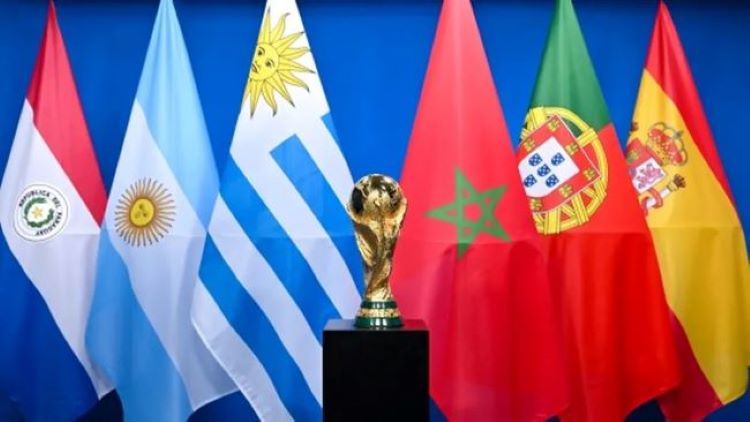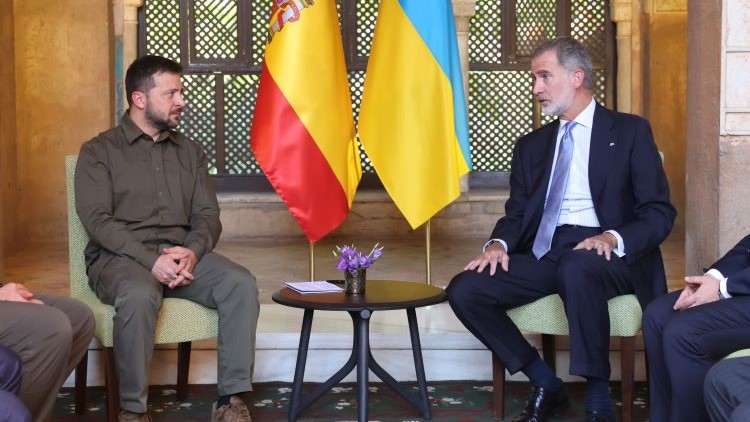The Diplomat
King Mohammed VI of Morocco and the president of Portugal, Marcelo Rebelo de Sousa, have expressed their satisfaction with the decision of the Fédération Internationale de Football Association (FIFA) to award the organization of the 2030 World Cup to the joint bid between Spain, Portugal and Morocco.
“This decision by the Council of the International Football Federation salutes and recognizes Morocco’s prominent place in the concert of great nations,” said Mohammed VI through a statement from the Royal Cabinet. “His Majesty the King expresses, on this occasion, his congratulations to the Kingdom of Spain and the Republic of Portugal, reiterating the commitment of the Kingdom of Morocco to work in perfect synergy with the bodies in charge of the dossier in each of the host countries,” he added.
“Since the candidacy of Portugal and Spain to organize the 2030 Men’s World Cup was launched, the President of the Republic was convinced that it was a winning candidacy,” declared Marcelo Rebelo de Sousa in a press release. The result “exceeds expectations, because it has gone from being a purely European candidacy to a European, African and South American candidacy, linking countries that have a common history,” he added.
“We welcome this partnership with Spain and Morocco, with the certainty that it will be another demonstration that we have capacity and proven in the organization of major events,” said the Prime Minister of Portugal, António Costa, through his official X account, the former Twitter. “It will undoubtedly be a very successful World Cup,” he added.
For her part, the Portuguese Deputy Minister of Parliamentary Affairs, Ana Catarina Mendes, highlighted, in statements from the Assembly of the Republic, the success of a bid that reflects “the demonstration of unity in this diversity of cultures and the capacity of sport for integration.”
In addition to Spain, Morocco and Portugal, Uruguay, Paraguay and Argentina will host three first-phase matches in honor of the centenary of the World Cup, the first edition of which was held in Uruguay in 1930. For that reason, the opening match of the championship will be played at the Centenario stadium in Montevideo. “This recognition does justice to those pioneers who built the history of soccer,” declared the president of Uruguay, Luis Lacalle Pou.
The president also highlighted the fact that, for the first time in history, there has been an agreement in FIFA for the tournament to be held in Europe, Africa and America. “There has been a lot of determination, intelligence and generosity from other countries,” said the president.
In Spain, the acting Minister of Culture and Sport, Miquel Iceta, yesterday highlighted the “pride of the country” that the concession of the World Cup to the joint Spanish-Portuguese-Moroccan bid represents, as opposed to the “many political noises” about “whether we are terrible, whether Spain is breaking up, whether we are close to the apocalypse”. FIFA “trusts Spain because it knows it is a very competitive country and capable of organizing a sporting event of this magnitude,” he added.
On Wednesday, acting President of the Government, Pedro Sánchez, said via X that it was “great news and great pride that Spain, Portugal and Morocco have been designated to host the 2030 World Cup.” “We will demonstrate the strength of our country’s soccer as world champions, and we will defend the values of equality, solidarity and healthy competition that should accompany sport,” he added.
Pedro Sánchez met precisely with FIFA president Gianni Infantino on September 19 in New York (on the sidelines of the 78th UN General Assembly) to defend the joint bid of Spain, Portugal and Morocco. The meeting took place after the controversy generated by the non-consensual kiss on the mouth that the recently resigned president of the Spanish Football Federation, Luis Rubiales, gave to the soccer player Jenni Hermoso after Spain won the Women’s World Cup, an incident that jeopardized the Spanish bid. During the meeting, Sánchez personally conveyed to Infantino that the new Spanish Sports Law, adopted in December, “incorporates principles that are widely embraced by Spanish society, such as equality and the integration of people with disabilities”.







